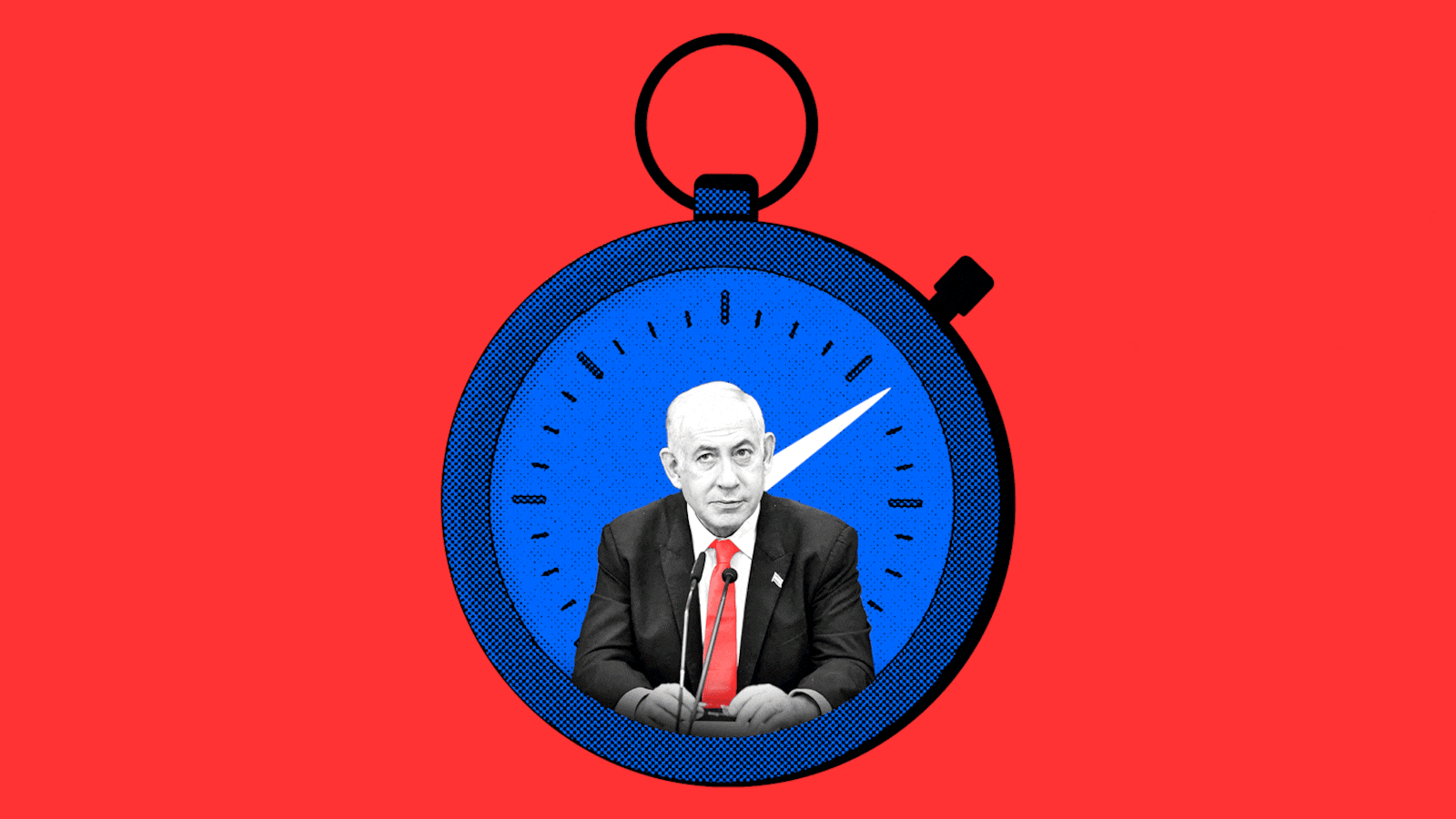Benjamin Netanyahu is facing a new wave of reprisal more than three months into the Israel-Gaza war, with hostage families and the prime minister’s own war cabinet accusing him of prioritizing his own war aims over the release of more than 100 hostages still in Hamas captivity.
This week, Hamas released a series of videos of three hostages—Noa Argamani, Itai Svirsky, and Yossi Sharabi—pleading for release. In a second video, Hamas warns they will soon reveal the captives’ “fate.”
The third video, which was released on Monday, appears to show the dead bodies of Svirsky and Sharabi. Kibbutz Be’eri has since confirmed their deaths. Argamani, speaking under duress, said in one video that they were killed by “our own IDF strikes.”
Referring to the videos as psychological pressure tactics, Israeli Defense Minister Yoav Gallant said “Hamas are hit badly by the IDF and all that is left for them is to bring psychological torment to the families [of the hostages], leaving the IDF to clarify things for the families later.”
The pressure from Hamas to ease up on the strikes, though, isn’t the only scrutiny Netanyahu has been facing. Netanyahu’s own war cabinet has begun railing against the current strategy in Gaza. Benny Gantz, a member of the War Cabinet, and Gadi Eisenkot, his deputy, noted on Saturday that Netanyahu ought to focus on hostages’ release even if it means pausing the war against Hamas and revisiting that military plan later.
“We need to stop lying to ourselves, show courage and lead to a big deal that will bring the hostages home. Their time is running out and every day that passes puts their lives at risk,” Eisenkot said, according to Ynet News.

Officials have found some progress on hostage talks—Qatari officials announced Tuesday they have brokered a deal with Hamas to arrange for the delivery of medicines to the hostages, who have been without medication since they were taken captive.
The medicine deal is a step in the right direction, but it’s not anywhere close to the deal that we need for the hostages, David Harden, a former USAID mission director in the West Bank and Gaza, told The Daily Beast.
“Medicine for innocent civilians and hostages is a positive thing… I also think it’s striking that more than 100 days in, this is the level of minutiae and detail that we have gotten to, which I think is a tough indictment on Netanyahu trying to get the hostages released... What did we get? We got some medicine going in. It’s rather disappointing,” Harden said.
“This is gonna be Netanyahu, his political calculation. I just find it hard to believe that he can’t strike a deal that could lead where we get some more of the hostages released,” he added. “The longer they stay in there, the more trauma the face, the more risks they face, more likely that others are going to die.”
The growing pressure comes after the United States, Qatar, and other allies worked together last year to arrange the release of dozens of hostages from Hamas’ clutches. In November, diplomats were able to arrange a series of temporary ceasefires and the liberation of hostages from Gaza. But since then, not a single hostage has been released, and families of hostages are also mounting their calls for the Israeli government to do more to usher along the end to the hostages’ suffering.
Liz Hirsh Naftali, the great-aunt of Abigail Edan, who turned four while held hostage and who was released in a hostage deal in November, urged the United States Wednesday to do more to push for the release of the 130 remaining hostages. But she blamed primarily Netanyahu for his failure to prioritize the hostages.
“Too many lives are at stake and we need to do more,” Hirsh Naftali said in an appearance on Capitol Hill Wednesday, thanking Qatar, the Biden administration, and members of Congress for urging along earlier releases.
“This hold up is really not with the U.S., or with the Qataris. This hold up is with the Netanyahu government,” she added. “The lack of action to bring home these loved ones, clearly demonstrates to us that he wants to keep this war going to remain in office, and we need Prime Minister Bibi Netanyahu to stop making this priority himself.”
Yarden Gonen, the older sister of Romi Gonen, 23, a hostage in Gaza, said it would be “a win for global terrorism” if the hostages aren’t brought home safely.
Oran Neutra, the mother of Omer Neutra, 22, an Israeli-American citizen, called on the United States to do more to bring home the captives.
“We’re trying really hard to keep up hope,” Neutra said. “But at no point in our lives so far have hope and prayer in and of themselves without action ever yielded results.”
A bipartisan group of American lawmakers worked to reassure families that Congress and America is still working day after day to secure the release of the hostages.
“We can and must do more,” Sen. Ben Cardin (D-MD) said.
“My message to the family members is this we have not forgotten you,” Sen. Susan Collins (R-ME) told reporters.

A protester lifts placards against Israeli Prime Minister Benjamin Natanyahu during a rally demanding the release of Israelis taken hostage a hundred days earlier by the Palestinian Hamas movement on October 7, outside the Parliament in Jerusalem on January 15, 2024.
Ahmad GharabliAFP via Getty ImagesA bipartisan group of lawmakers plans to hold a meeting on Thursday with U.S. Secretary of State Tony Blinken, who has been shuttling through the Middle East in recent days to press for next steps.
Jake Sullivan, Biden’s National Security Adviser, met with the Prime Minister of Qatar discuss the hostages’ status in recent days. Brett McGurk, the White House Middle East coordinator, has also been in Doha this week to work on pushing forward some hostage initiatives.
“We’re working on this very, very diligently,” John Kirby, a National Security Council coordinator, told reporters Tuesday.
Even so, a hostage deal appears to remain stuck in second gear.
Egypt and Qatar have been working behind the scenes to propose next steps towards a ceasefire and hostage releases, but several of the proposals have fallen on deaf ears in Israel.
Under mounting pressure from the United States and other partners to decrease civilian casualties in the war, Israel itself has begun working on the next phase of war, in which the Israeli Defence Forces will be focused on “remaining terror hotspots,” according to a Ministry of Defense document previously obtained by The Daily Beast.







